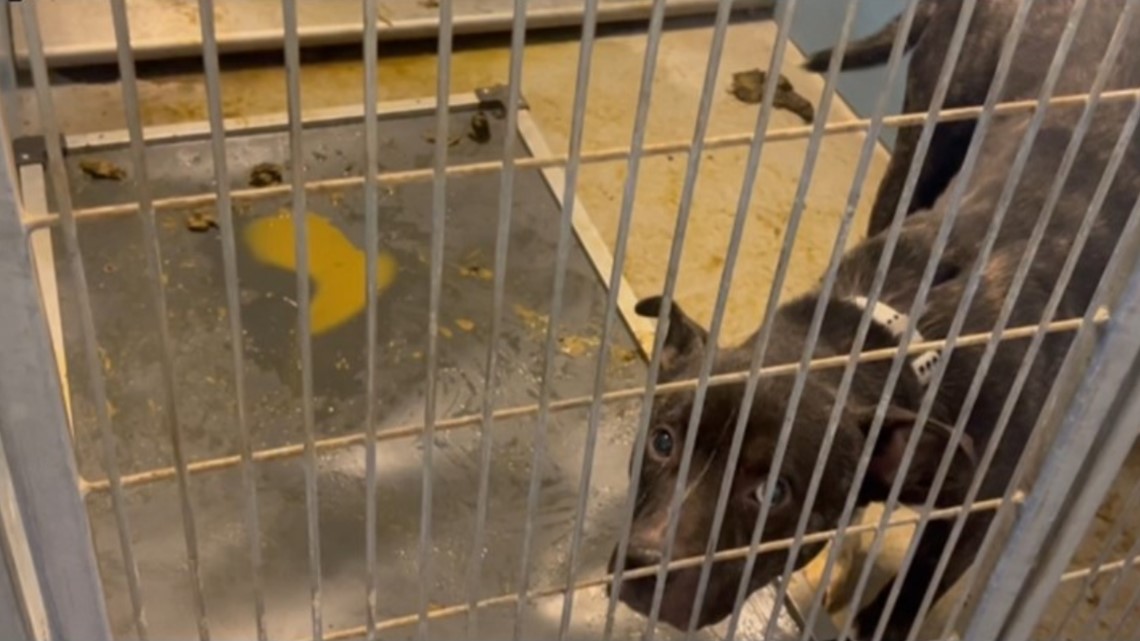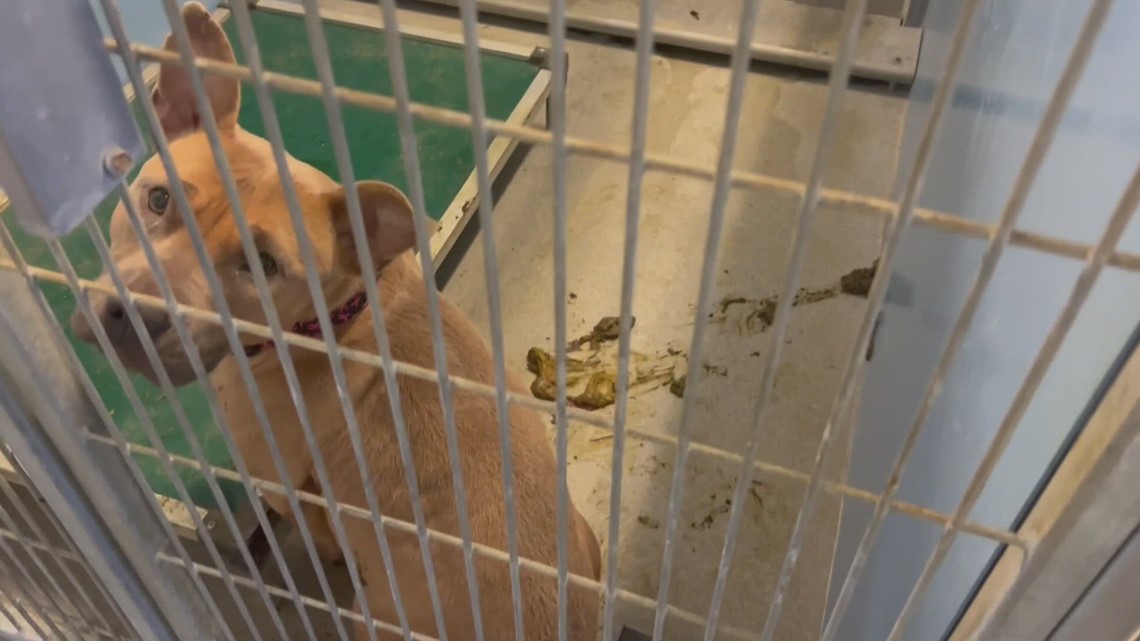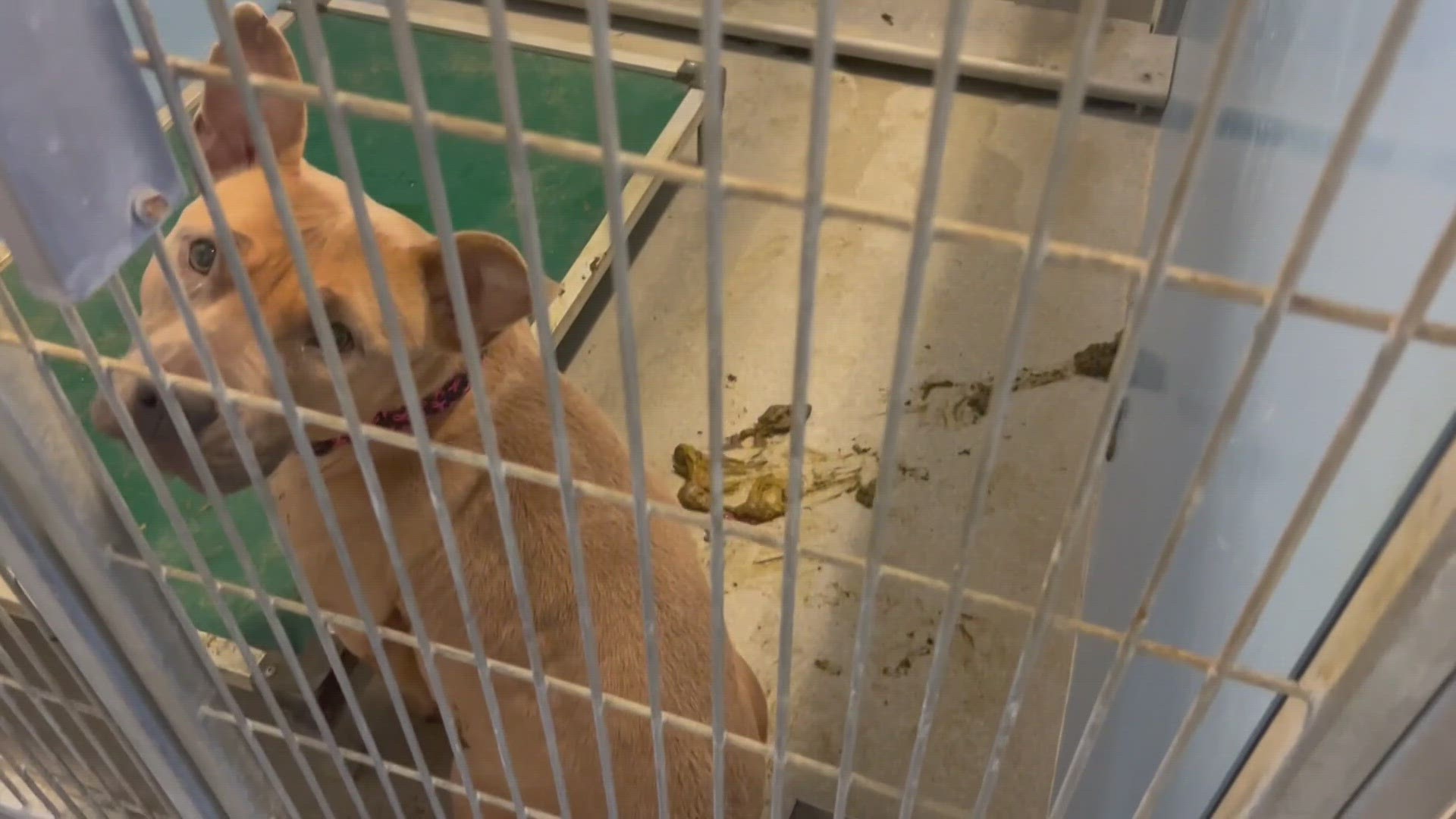JACKSONVILLE, Fla. — Animal Care and Protective Services, also called ACPS, houses thousands of animals each year. The hope is that the dogs and cats will find permanent homes with families.
But recently, First Coast News has been receiving messages and emails from people concerned about the conditions the dogs are in while staying at ACPS. One person called it "deplorable." So, we took a deeper look into the issue.
Alison Franciscus says she began volunteering at ACPS in September.
"Going into the shelter, you understand how dire the situation is for those dogs and that is why I decided to volunteer at that shelter specifically," Franciscus told First Coast News.
However, Franciscus says the conditions she saw has driven her to speak out.
"The kennels will be covered from wall-to-wall with feces, some are bloody because they have 'raw paw,'" Franciscus said.
'Raw Paw' are abrasions on dogs' paw pads, often caused by extensive activity on concrete.
Susan Blanar recently adopted a dog from ACPS and echoes Franciscus's sentiment.
"The one I’ve got, her paws are all stained, she is a white dog," Blanar said. "All stained orange from the urine and poop. That is going to take a while to get cleared up."
Blanar says when she went into the facility in August, she found the conditions "deplorable."
"It was feces everywhere, multiple piles and they were stepping all in it and dragging it around," Blanar described. "I think that is something they need to work on."


To look into these concerns, First Coast News visited ACPS three times during the week of Nov. 6, 2023, at various times during the day.
During the visits, First Coast News saw conditions similar to what was described. Dogs had multiple piles of feces in their kennels, some of which was smeared on the kennel floors or walls as well as saw several cages that had ‘raw paw’ designations with notes to keep the kennel dry and lined, but were wet or dirty with smeared feces.
A person connected to the animal rescue community, told First Coast News the amount of feces in the kennels was particularly concerning because they worried the dogs were not getting walked outside enough. They asked to remain anonymous to speak in this story.
"A lot of feces in many, many of the cages and not just one feces, but like they had gone one or three times," the anonymous person said. "If we get attention brought to this, I am sure we have a community here that would step up to help."


First Coast News took the concerns to Michael Bricker, the Chief of Animal Care and Protective Services. He’s been on the job since September.
"We do not think any dog should be in a messy kennel, but our number one priority is getting that dog out of that kennel forever," said Bricker. "Getting it into a forever home, getting it into a foster or a rescue."
Bricker says there is a kennel attendant scheduled for every two kennel runs and they clean throughout the day. He says his priority is getting the dogs out of the kennels all together.
"In animal welfare, we call it fecal painting when it is smeared all over," Bricker told First Coast News. "The reason the dog is doing that is not because it is in a messy kennel, it is because it is in a kennel at all. It wants to be out, it wants to be in a play group or on a walk, that is our priority."
Furthermore, Bricker admits that with over 300 dogs, not every dog is able to get outside each day.
"We are getting about 140 dogs out every single day consistently, which means some dogs don’t get out in a day yet, but that is something we are definitely working hard to do," Bricker said.
As for the dogs with 'raw paw' alerts, Bricker says the protocol to treat 'raw paw' was established before his time and he wants to focus on why the dogs are getting the abrasions or injured paws.
"We are trying to get dogs out of the kennels more," Bricker told First Coast News. "We are doing more walkthroughs, we are doing things to prevent those things from happening."
Bricker says his focus is on raising the profile of ACPS within the Jacksonville community and getting the dogs out at community events and hopefully adopted. While Franciscus, Blanar and others say they think more staffing is needed to get the dogs outside daily and to keep the kennel conditions more sanitary, Bricker says he first wants to get to a full staff.
"So, I want to assess what we're doing with those positions," Bricker said. "How we work when we're at a full team and then figure out if we do need additional staffing or what what else we do need."
With 264 kennels and over 300 dogs, Bricker contends that conditions will improve if more dogs can be adopted into homes.
"Once we do more adoptions, send more dogs to rescues, the kennels will be cleaner and cleaner and once we get more volunteers, that would be a huge help, too," Bricker told First Coast News.
But, Franciscus says she worries the conditions of the kennels could turn away potential adopters visiting ACPS.
"You can’t expect people to want to adopt dogs that are covered in feces, that are cold, that are shivering, that are shut down," Bricker said. "You can’t expect that, they need help."
First Coast News reached out to Mayor Donna Deegan’s office about funding for ACPS. A spokesperson for Deegan says her proposed budget increases ACPS funding by 13 percent, which is an additional $626,747 for a total of $5,426,557.
If you would like to volunteer at ACPS, the shelter has various roles where the public could help, like walking dogs or assisting at adoption events. If you are interested in adopting a dog or cat, you can visit the ACPS facility on Forest Street; it is open weekdays from noon to 7 p.m. and on weekends from 10 a.m. to 6 p.m.

